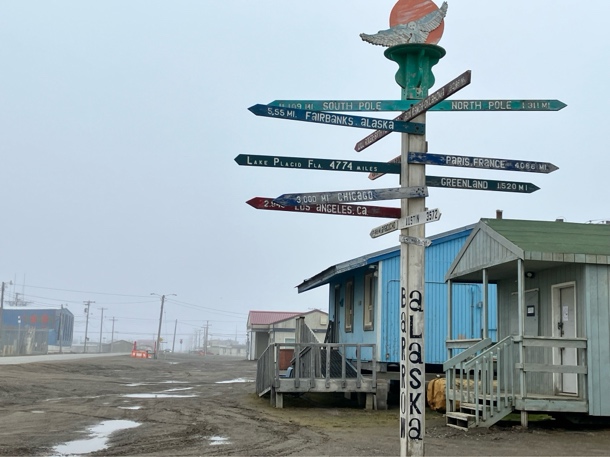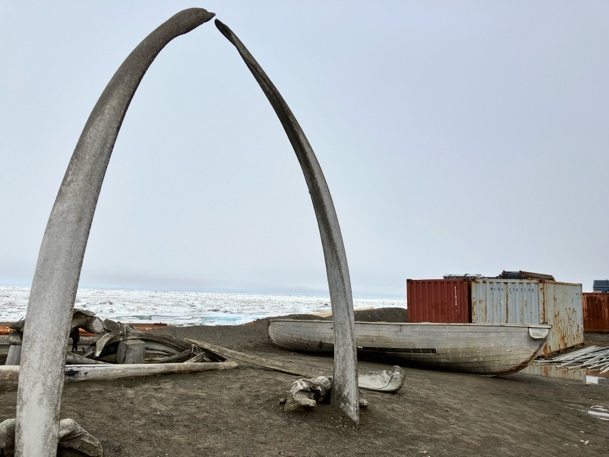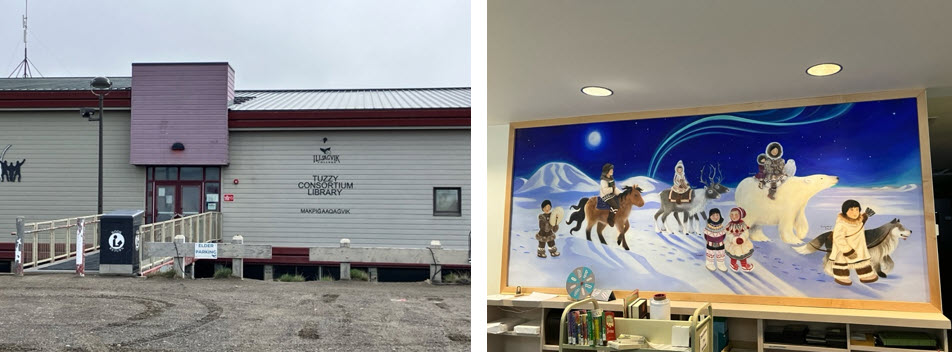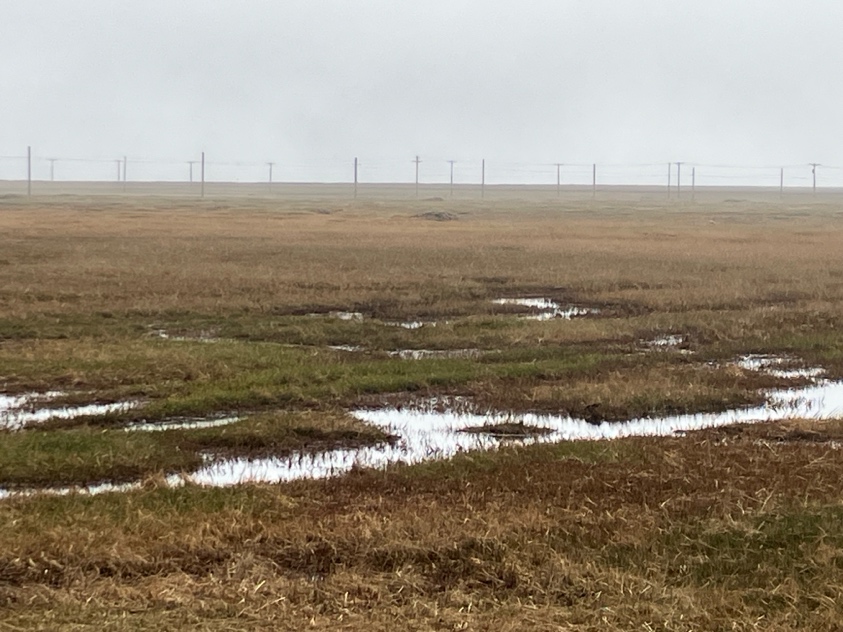Tuzzy Consortium Library, Iḷisaġvik College
Crisis management and planning have become an increasing focus for the staff of libraries, archives, and museums. This illustrative example demonstrates how a remote Alaska library consortium balances connecting the community to information and resources, while keeping staff, students, and patrons safe.
About the libraries

Situated in the North Slope Borough of Alaska, about 150 miles north of the Arctic Circle, the town of Utqiaġvik is home to about 5,000 individuals, the majority of whom are native Iñupiat. The distinct landscape transitions from expansive green-brown tundra in summer to swaths of icy snow in winter. Rutted dirt roads meander around uniquely structured homes, churches, and businesses in Utqiaġvik, whose neighborhoods include nearby Browerville and Bowerside. The temperamental Chukchi Sea provides both sustenance through whaling traditions and danger in intermittent flooding around the town. To withstand the flooding and the melting permafrost, many structures are built on pylons that raise homes up above the water or ice. Various lagoons throughout town are connected by bridges and footpaths, giving pedestrians striking views in all directions. Access to the town is primarily through air travel (and ships in good weather), so many agricultural products, produce, and building materials for the town are flown in, significantly contributing to the high cost of goods in the area. Major industries in the area include the oil industry, educational services, healthcare, and retail, among others.
Iḷisaġvik College in Utqiaġvik is a small tribal college that “provides quality post-secondary academic, career and technical education in a learning environment that perpetuates and strengthens Iñupiaq culture, language, values, and traditions.” The college offers certificates, associate degrees, and one bachelor’s program in business, and is looking to expand to other fields, such as education. Amanda Sialofi, Dean of Administration at the college, shared a variety of ways in which the college seeks to support and serve the community in Utqiaġvik, especially through financial assistance, which makes higher education a possibility for many individuals. Amanda shared, “One of the things that I really like about Iḷisaġvik is that we don’t do student loans. We don’t want students leaving here with more debt.” The college helps students apply for scholarships and grants, provides tuition waivers for residents and AN/AI (Alaska Native/American Indian) for off-slope students, and points students toward subsidies from their corporations and tribes, which removes a large barrier of entry for many community members.

In 2009, the college also began offering subsidized summer camps for children in the area that offer them the opportunity to explore future career options, such as STEM-related fields, health, carpentry, photography, journalism, and more, in two-week intervals that take place on campus and around the community. Many children who participate in camp go on to become camp staff and then eventually students at the college—providing a positive, constructive pipeline of education and opportunity for residents. Amanda pointed out that partnerships with health-related organizations nearby and with various communities have helped to expand the summer camp opportunities as well as enrollment through participation in events such as jamborees.
The Tuzzy Consortium Library is named for Evelyn Tuzroyluk Higbee of Point Hope, whose nickname was Tuzzy. The library sits three miles closer to town from the main campus of Iḷisaġvik College, enabling it to serve both the college and the community in Utqiaġvik. The library’s collection prioritizes “arctic and polar regions information, the North Slope, and the Iñupiaq history, language, and culture” through print and digital items; programming that supports community engagement and learning; and a local archive of historical documents, papers, media, and photos, including issues of the Tundra Times. Tuzzy is also a Federal Depository Library, enabling the library to provide government information to the public free of charge.
The library is supported by Teressa Williams, the library director, Zoe Holland, the academic librarian, Nick Roghair, the archivist, and other staff. The library is in the process of hiring a public services librarian, but in the meantime, Zoe is filling aspects of both roles, which include doing a weekly radio show that lets people know about upcoming events and information about the library; supporting faculty and students through reference, teaching, and research advisory; and running programs. The library’s archive, managed by Nick, houses various historical documents, including photos and papers of prominent townspeople, videos of life in the town from years past, court documents and records, books about Native traditions, languages, and experiences, and more.

Crisis management
There is a strong sense of community at the college and at the library, and an interest in serving and supporting the community through prioritizing belonging and togetherness. This spirit is evident in the ways both the college and the library handle various crises and emergencies that can occur. Both Amanda and Zoe talked about the impact on their institutions from external forces such as weather-related flooding or wildlife concerns; industry-related accidents such as chemical spills; and social- or community-related issues such as substance abuse, violence, and more. Both institutions seek to address particularly the social- and community-related issues from a community-focused, collaborative approach.
Amanda emphasized how the college seeks to encourage and guide students once they are admitted. Because most of the college’s crises involve student-related incidents, Amanda notes that Student Services staff are well-equipped to work with the students to resolve a dispute or code of conduct violation, or to help students understand that they are responsible for their own actions. Amanda shared, “We want our students to be successful, and we truly believe in second chances. Plus, we are the only training institution on the North Slope, and the only public library in our community as well. So it’s hard when you lose those services, because then it limits your access and resources.” Amanda views these situations as opportunities to teach students soft skills, in addition to the skills they learn in their classes, that will help them to be successful in life. Amanda also strives to embody the spirit of the community in the ways the college interacts with, teaches, and supports the students, so that they feel a part of the college and they can carry those values forward into their lives.
Part of this community-focused spirit also involves proactive preparation. Amanda shared that the college has various general policies and procedures regarding safety on campus, which are detailed in the college’s Emergency Action Plan. This printed and digital document, kept in each building on campus and at the library, outlines the steps to take, the contact information for individuals responsible during emergencies, and more. In this way, college staff are prepared and informed as to what to do when an emergency happens.
Additionally, Alfred Michael, Safety Specialist, organizes regular training for campus and library staff on first aid and CPR, fire extinguisher use, Narcan use, and Mental Health First Aid. Alfred also makes sure the buildings and the library have working fire extinguishers and up-to-date first aid kits across campus. Amanda added that, for the summer camps, staff usually complete mandatory reporting training, Mental Health First Aid, and other trainings intended to help camp staff feel empowered and equipped to handle concerns about domestic violence or child abuse situations, with the help of services in the town of Utqiaġvik. This kind of training is an example of how the college’s policies and procedures have been adapted and refined over the years, enabling the college to be nimble and responsive to dynamic situations. Communication with students, faculty, and staff are also key to proactive preparation for the college, and the administration uses email, social media, and an app called Livesafe to alert people to a closure, a delayed start, a wildlife sighting, and more.
Tuzzy Library also encounters a range of crises, from weather-related power and internet outages to chemical spills, difficult social situations in the community, and the dangers that can arise from proximity to wildlife. The library building will sometimes have to close when the power goes out and the building cannot maintain a safe temperature for staff and patrons. These outages can stem from seasonal storms that affect the town utilities and infrastructure. Closures can also be due to sewage system problems as well as local chemical spills—often due to oil field operations that result in a building catching fire and harmful smoke and chemicals being released into the environment. The college offers HAZWOPER training for people who work on the oil fields to learn how to clean up these hazardous materials. The library supports this work through their workforce education initiative that provides access to specialized machinery in nearby Quonset huts so people can learn to drive and fix them. At times, though, use of these machines can also contribute to oil spills that then require attention for safety. Nick added that the library’s archive has already dealt with a water leak that compromised some audiovisual material; he laments the fact that the archive is not housed in a protected space that would allow for proper preservation techniques to be implemented. If items are requested by individuals who are not nearby, Nick works with their related institutions and libraries to ensure safe handling and informed application of archival procedures to safeguard the item during transit and use.
The library also serves patrons trying to escape domestic violence situations or homelessness. Zoe noted that some patrons visit the library from the Arctic Women in Crisis center because “it is a safe place where they can use the internet to fill out forms, apply for assistance and employment, access resources, and more.”
Finally, wildlife can have a significant impact on life in the town. For instance, people at times report polar bear sightings in the area, particularly in fall as the bears wait for the ice to solidify and in spring as the ice breaks up and the bears return to land. The bears can present a significant danger to the town, as their unpredictable behavior can make the area unsafe for people to move about. Therefore, the town has posted placards in prominent places that offer guidance on how to respond should encounters take place.

The library’s approach to managing these difficult situations is to provide information to the community and support their needs and priorities where possible. The library works to stay in touch with the community through a variety of approaches, including a radio program and a library bulletin board with brochures of resources for domestic violence and trafficking victims, and information about the library being open as a warm space and as a place to access online resources. In terms of working with the college, library staff keep an incident log at the library that tracks situations. Major incidents that involve criminal activity or require further intervention/investigation require a separate incident report to be filled out as well, and that is what would be sent on to the college. The library staff will decide at the time of the incident whether it is serious enough to warrant this formal report or a more colloquial notification of college administration.
For the future of Iḷisaġvik College and Tuzzy Consortium Library, Amanda and Zoe are hopeful about how these institutions can continue to serve the residents of Utqiaġvik. The college is looking to secure a location for a new campus so that students and staff can benefit from updated facilities and resources. Similarly, Zoe looks forward to having a public services librarian colleague who will do outreach work with community members to continue to build awareness of what the library can offer the town. The library has also been taking steps to establish a committee that can review library policies for situations such as book and program challenges, so that should such a situation arise, there is a body that can address concerns and guide the library.
To learn more, visit the college’s website. For more information about the college's Emergency Action plan, please reach out to the college.
Recommendations
- Look for ways to support and guide your community through difficult situations, whether it’s through a spirit of collaboration and connection or through regular communication. When your community knows to rely on your institution for information, then you are succeeding in being an anchor in the community.
- Investigate ways to develop and implement relevant training that can empower and inform your staff to handle common situations. By doing this, you are helping to ensure that your whole institution is committed to safety and well-being.
- Look for ways to be present out in the community, at events and activities that are meaningful to the community. In this way, you are building awareness and visibility and learning more about the community you serve. Then when a crisis occurs, you have laid a solid foundation on which you can implement processes and procedures that can help keep the community safe.
